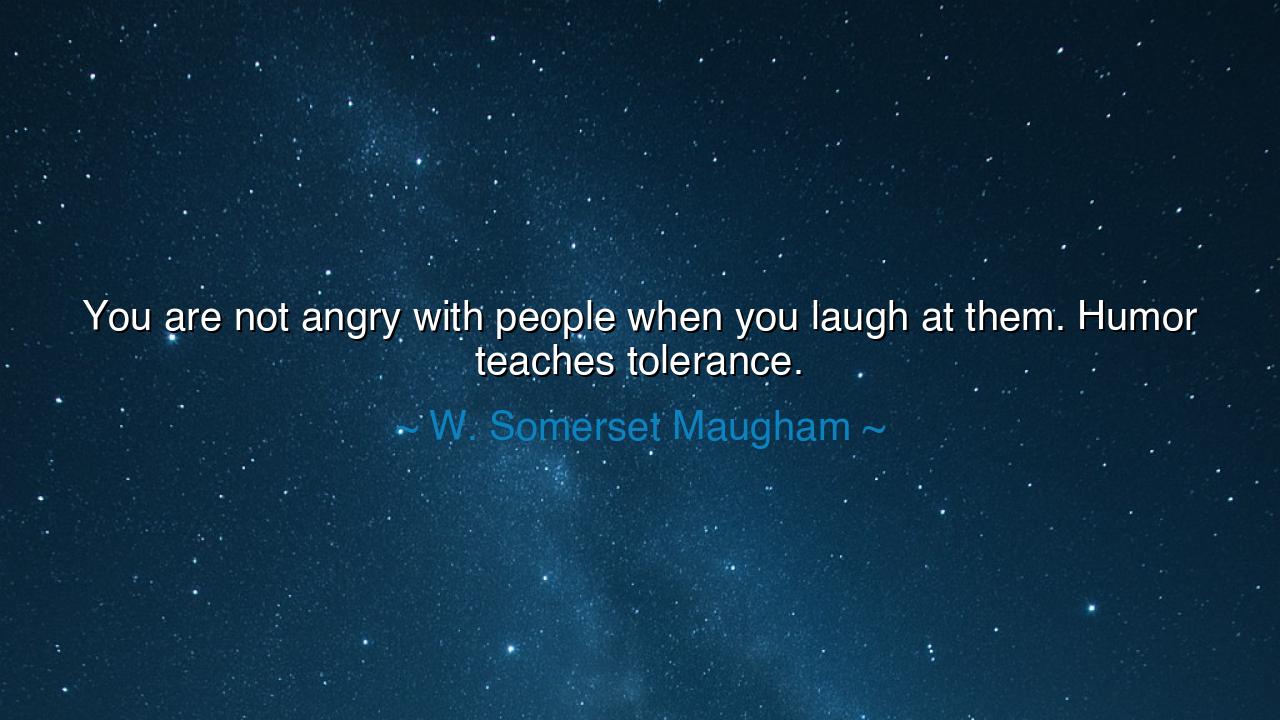
You are not angry with people when you laugh at them. Humor






Hearken, children of the ages, and attend the wisdom of W. Somerset Maugham, who spoke: “You are not angry with people when you laugh at them. Humor teaches tolerance.” In the ancient ways, laughter was no mere indulgence; it was a mirror held to the human soul, reflecting our foibles without the bitter sting of reproach. To laugh at another is not to scorn, but to acknowledge the imperfection inherent in all men, to meet folly with light rather than fury, and thus to cultivate the sacred virtue of tolerance.
In the courts of emperors and kings, jesters walked the thin line between ridicule and respect. Their humor could expose arrogance, folly, and pride, yet the laughter it provoked softened hearts rather than hardening them. The jester’s art was not cruelty, but revelation—a gentle teacher whose humor guided kings and courtiers alike toward self-awareness. In this way, laughter becomes a bridge, uniting even those divided by status, opinion, or passion, and reminding all that no soul is without imperfection.
Consider the tale of Mark Twain, that master of satire, whose quills danced with humor aimed at human folly. In his stories, the villagers, the authorities, and even himself were subjects of jest, yet none of his laughter carried malice. Through the lens of humor, readers learned to see the weaknesses and eccentricities of men as universal, shared burdens rather than sins deserving anger. Here, Maugham’s truth is revealed: when one laughs at others, one ceases to bear the chains of resentment, and the heart opens to compassionate understanding.
Even in the shadow of conflict, humor has taught tolerance. During the turmoil of the First World War, soldiers of differing nations shared stories and jokes in fleeting moments of peace, finding laughter amidst suffering. In the trenches, laughter bridged language, rank, and background, creating fleeting kinships where suspicion and anger might have otherwise reigned. In such moments, humor became a balm, teaching men to see the shared humanity beyond their differences.
Yet, the lesson is subtle: laughter must spring from empathy, not mockery. To scorn another’s suffering is cruelty; to laugh with insight is enlightenment. Tolerance, as Maugham suggests, is born not from avoidance of conflict but from recognition of human imperfection. It is a disciplined laughter, one that measures its own power and wields it to soften hearts, to awaken understanding, and to transform anger into gentle awareness.
History offers countless echoes of this truth. Voltaire, that master of wit and critique, wielded humor to challenge dogma and oppression, yet he never sought to inflame anger unnecessarily. His laughter was a weapon against injustice, yet it was guided by wisdom, teaching his readers to confront folly without hating the fool. In this balance, we see that laughter does not destroy—it enlightens; it does not divide—it teaches tolerance.
From these teachings, we derive a lesson for all who walk the earth: to laugh at others is not to diminish them, but to acknowledge the shared flaws of all men, to cultivate patience, and to temper judgment. Let your humor be gentle yet perceptive, your laughter rooted in empathy rather than disdain, and your heart open to the humanity that binds us. In doing so, you transform ridicule into wisdom, and amusement into a guide for living.
Practical action follows naturally from this understanding. Observe the quirks and missteps of others with a light heart. Reflect before you mock: let your laughter teach, not wound. Seek opportunities to diffuse tension with wit rather than anger. In daily life, embrace humor as a teacher, letting it dissolve grudges, foster understanding, and strengthen bonds. In this way, as Maugham reveals, you will discover that the simple act of laughter carries within it the profound power of tolerance.






AAdministratorAdministrator
Welcome, honored guests. Please leave a comment, we will respond soon